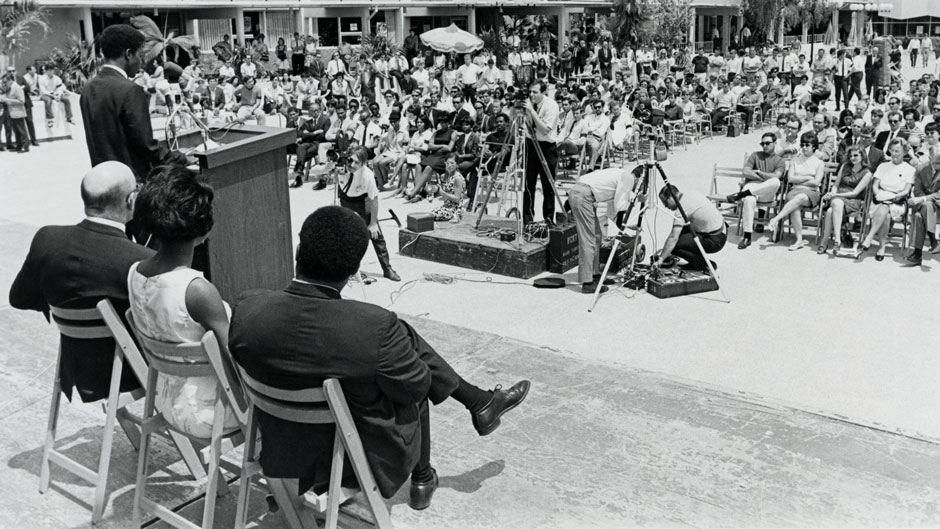Fifty years ago, on April 4, 1968, an assassin fatally shot the Rev. Martin Luther King Jr., provocative leader, Nobel Peace Prize winner, and social justice champion, as he stood on the balcony of a Memphis, Tennessee hotel.
King had come to Memphis to support sanitation workers, engaged in a 7-week strike for better working conditions. The night before his death, King addressed a full assembly at the Mason Temple as a thundering rainstorm raged outside. His inspired speech that evening was eerily prophetic.
“Like anybody I’d like to live a long life, longevity has its place. But I’m not concerned about that now, I just want to do God’s will…I’ve been to the mountain top…and I’ve seen the promised land. I may not get there with you, but I want you to know that we, as a people, will get there.”
Though the bullet ended King’s life, it certainly did not end the movement for equality and social justice that he championed. Much progress has been made in the decades since, and yet much remains to be done because as Dr. King said: “We must learn to live together as brothers or perish together as fools.”
A few days after Dr. King’s death, the United Black Students at the University of Miami and UM President Henry Stanford organized a memorial service on the UM campus. Guest speakers included Senator Harry Cane and the Rev. Theodore Gibson.
The 50th anniversary of King’s death offers a unique time for reflection, an opportunity to gauge the evolution of King’s quest to end racial discrimination and segregation in the United States.
Several members of the UM community offer their thoughts:
“Two years before his assassination, Dr. King visited @univmiami to denounce the causes of ‘poverty, ignorance, social isolation, and economic deprivation.’ Today, we pause to mourn, but may we continue moving towards his vision of justice & democracy.”—UM President Julio Frenk tweeted on Wednesday
“The words of Martin Luther King Jr. still resonate with me because they echo the struggles that my people still face. MLK was fighting for the basic rights of black and African American people, something that to this day is still infringed upon. As a woman of color I can only hope that just like Dr. King wanted a world of equality, and a world where his children weren’t discriminated against for being black, I can live a world where my brown skin isn’t viewed as something that is unworthy of basic human rights.”—Camila Rodriguez-Rojas, Class of 2019
“When I think about the legacy of Dr. Martin Luther King Jr., the first word that comes to mind is HOPE. Dr. King inspired a legion of people to believe that equality is necessary and that dreams require action. It is because of great men like him that so much progress on racial inequality and injustice has been made thus far. And, while there is still much work to be done, he and others laid the groundwork for students and, specifically students of color, to believe in their absolute privilege to stand up for their rights, the causes that they believe in, and to know that there is power within all of us to be the change that we want to see in our communities, this country, and the world!”—Keion L. Farmer, Class of 2018
“Martin Luther King Jr.’s dream is one of the reasons why I am able to say that I am Nigerian-Kittitian-American graduating from the University of Miami this May. His dream helped catalyze the changing of policies that allowed this University amongst many others to open doors and thus create opportunities for students of color to thrive academically. Today, I too, dare to dream. I dream that by the time I have kids and they start to look at colleges, I can boast that my alma mater has a diverse black population in all areas of the University. I would tell them that there is a proportionate number of black faculty, staff and students of African, Caribbean, Latin descent that look like them, speak like them, and truly understand them. I can say that the University listened to the appeals of the students when I attended and acted to make the necessary changes to enhance the quality of the black experience. I will tell them that the University is a place that turns dreams to reality and that they, just like Martin Luther King Jr., just like myself, and just like many other students, should continue to dream.”—Olumayowa (May) Olujohungbe, Class of 2018
“Dr. Martin Luther King Jr.'s career and life created a watershed moment in human history that has created a stronger and more just society. Hopefully today will encourage people to reflect on themselves and if they have held themselves to the same standard of compassion that Dr. King would have.”—Jane Huh, Class of 2020
“As a first-generation college student, Dr. Martin Luther King, Jr. has taught me to smile in the face of adversity and challenge it. He inspires me to build my own seat at the table rather than wait for one to be given. I aspire to continue his legacy by making sure education is open to all people regardless of race, gender, and class.”—D’Andre McIntyre, Class of 2019
Koichi Tasa, head of University Archives for University of Miami Libraries, contributed to this report. University Archives provided the historic 1968 photo for this report.

